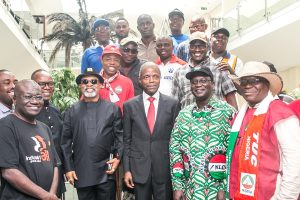In a press interview he granted in mid-July, the Trades Union Congress (TUC) President, Boboi Kaigama said an agreement had been reached on a new minimum wage. He however refused to provide specific figures on the amount reached. According to him, the government would declare this by the end of August. It is not yet certain when implementation of whatever amount was agreed upon would commence.
The Minister of Labour, Dr Chris Ngige had earlier dismissed the possibility of keeping faith with the September deadline set for this, when speaking at the International Labour Conference at the end of May. Ayuba Wabba, the NLC President spoke out against this, insisting that the September date was sacrosanct.
But, the likelihood of ensuring this for all workers is slim. It could take immediate effect for Federal Government workers, but would have to be passed into law as a National Minimum Wage Act by the National Assembly.
This, however, is the least of working-class people’s problems. One thing that is almost certain is that the APC Government is committed to enacting a new minimum wage, with elections around the corner. Its aim is not necessarily the improvement of the living conditions of workers. It intends to try wooing us with some pittance, just as the PDP government did on the eve of the 2011 elections.
More importantly, we are concerned with having a new minimum wage that is a living wage. NLC and TUC demanded a N66,5000 new minimum wage. This was based on sound analysis which took into account the cost of living.
N18,000 as minimum wage was considered grossly inadequate by working-class people seven years ago. Amounting to barely $150 at the time, it fell short of the subsisting minimal cost of living which had informed demands for a N52,500 minimum wage. But, it was the result of a tripartite agreement which the trade unions reached with private sector employers and government.
 The question on all rank and file workers’ lips today is “just how low have our union leaders bent, in ‘compromise’ with the bosses, this time?”
The question on all rank and file workers’ lips today is “just how low have our union leaders bent, in ‘compromise’ with the bosses, this time?”
There are unconfirmed “leakages” that the new minimum wage would be N49,500. It needs to be said that, even if this is true, it would still be anything but a living wage. This would amount to barely $184, in the face of rising inflation, and increasing unemployment that has saddled many workers with large numbers of dependents. Such a wage increase is also late as the minimum wage should be increased every five years. If such a deal is accepted, then this should be that a further increase will be implemented with three years.
Meanwhile, some state governors have once again made it clear that they are not ready to pay any increase whatsoever in the minimum wage. Addressing the press after a Governors Forum meeting at the beginning of August, Governor Abdulaziz Yari of Zamfara and Chair of the Forum said “I don’t think you people voted us only to pay salaries. You are looking for good roads, electricity, education and others. So, we can’t do magic. It’s only when we have the funds that we can do all those things” (as if state workers do not provide such services).
This vile excuse is not new to the working-class. It was thrown up by the few states that still refuse to pay the N18,000 minimum wage over eight years after it was enacted. It has also been used to justify the criminal non-payment of salaries to workers, for between three and 24 months, in 27 out of the 36 states of the Federation.
The problem is not lack of resources to pay workers a living wage and still provide quality social services and infrastructure for development. The problem is that Nigerian politicians at all tiers of governance corruptly feed fat on the abundant wealth that should otherwise have been used to better the lot of working-class people. How many of the states claiming poverty have reduced the costs of their Government House, the travel budget for the Governor or sold their Lodge and other valuable properties the states hold in Abuja?
At the same meeting where Governor Yari had the cheek to say the nonsense he did, the governors resolved to stop the Economic and Financial Crimes Commission (EFCC) from probing the use of bailouts, including those from the Paris Club Funds, that were provided to states by the Federal Government for the payment of outstanding salaries of workers.
It is quite clear that having a living wage as the minimum wage and ensuring that this is implemented across the country requires much more than negotiation skills. These cannot become reality without coordinated and sustained workers’ mass action. The only reason why so many states have gotten away so far with owing workers backlogs of salaries, and why there are still a few states yet to pay the despicable 2011 national minimum wage today is because of the lack of effective mass action.
Rank and file workers need to be aware of the positions of both the bosses and their leaders in negotiating a new minimum wage, at each step of the way. Secrecy and long winded negotiations such as this, only benefits the bosses. The trade unions should be able to call workers out on strike to strengthen their hands in negotiations, if need be, to win a living wage as minimum wage.
In the coming period, without workers’ mass actions, including a series of general strikes, many – if not most – states will not pay the new minimum wage. Neither will the states owing workers’ salaries clear the backlogs. Freedom cometh by struggle, and so does winning a living wage as minimum wage.
by Baba AYE









